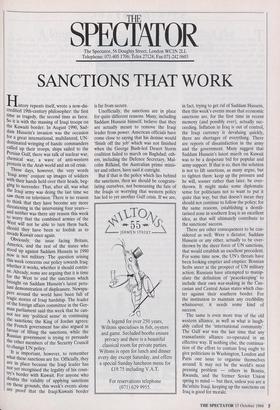SPECIATOR
The Spectator, 56 Doughty Street, London WC1N 2LL Telephone: 071-405 1706; Telex 27124; Fax 071-242 0603
SANCTIONS THAT WORK
History repeats itself, wrote a now-dis- credited 19th-century philosopher: the first time as tragedy, the second time as farce, So it is with the massing of Iraqi troops on the Kuwaiti border. In August 1990, Sad- dam Hussein's invasion was the occasion for a great international, multilateral, UN- dominated wringing of hands: commanders called up their troops, ships sailed to the Persian Gulf, there was talk of nuclear war, chemical war, a wave of anti-western protests in the Arab world and an oil crisis. , These days, however, the very words Iraqi army' conjure up images of soldiers with their hands held over their heads, beg- ging to surrender. That, after all, was what the Iraqi army was doing the last time we saw them on television. There is no reason to think that they have become any more threatening in the intervening four years_ and neither was there any reason this week to worry that the combined armies of the West will not be able to turn them back, s"1-lid they have been so foolish as to invade Kuwait once again.
Obviously, the issue facing Britain, America, and the rest of the states who stood up against Saddam Hussein in 1990 now is not military, The question arising this week concerns our policy towards Iraq: whether it works, whether it should contin- ue. Already, some are arguing that it is time for the West to end the sanctions which brought on Saddam Hussein's latest petu- lant demonstration of displeasure. Newspa- pers around the world have been full of tragic stories of Iraqi hardship. The leader of the foreign affairs committee in the Ger- man parliament said this week that he can- not see any 'political sense' in continuing the sanctions; the King of Jordan agrees; the French government has also argued in favour of lifting the sanctions, while the Russian government is trying to persuade the other members of the Security Council to change UN policy. It is important, however, to remember what these sanctions are for. Officially, they are in place because the Iraqi leader has not yet recognised the legality of his coun- try's border with Kuwait. For anyone who doubts the validity of applying sanctions on those grounds, this week's events alone are proof that the Iraqi/Kuwaiti border is far from secure.
Unofficially, the sanctions are in place for quite different reasons. Many, including Saddam Hussein himself, believe that they are actually meant to remove the Iraqi leader from power. American officials have come close to saying that his demise would `finish off the job' which was not finished when the George Bush-led Desert Storm coalition failed to march on Baghdad; oth- ers, including the Defence Secretary, Mal- colm Rifkind, the Australian prime minis- ter and others, have said it outright.
But if that is the policy which lies behind the sanctions, then we should be congratu- lating ourselves, not 'bemoaning the fate of the Iraqis or worrying that western policy has led to yet another Gulf crisis. If we are in fact, trying to get rid of Saddam Hussein, then this week's events mean that economic sanctions are, for the first time in recent memory (and possibly ever), actually suc- ceeding. Inflation in Iraq is out of control, the Iraqi currency is devaluing quickly, there are shortages of everything. There are reports of dissatisfaction in the army and the government. Many suggest that Saddam Hussein's latest march on Kuwait was to be a desperate bid for popular and army support. If that is so, then the solution is not to lift sanctions, as many argue, but to tighten them: keep up the pressure and he will, sooner rather than later, be over- thrown. It might make some diplomatic sense for politicians not to want to put it quite that way, but that doesn't mean they should not continue to follow the policy; for the same reasons, establishing a demili- tarised zone in southern Iraq is an excellent idea, as that will ultimately contribute to the sanctions' success.
There are other consequences to be con- sidered as well. Were a dictator, Saddam Hussein or any other, actually to be over- thrown by the sheer force of UN sanctions, that would establish an excellent precedent. For some time now, the UN's threats have been looking emptier and emptier. Bosnian Serbs sneer at the prospect of UN military action; Russians have attempted to manip- ulate the definition of 'peacekeeping' to include their own war-making in the Cau- casian and Central Asian states which clus- ter against their southern border. For the institution to maintain any credibility whatsoever, it needs some kind of success.
The same is even more true of the old western alliance, as well as what is laugh- ably called the 'international community'. The Gulf war was the last time that any transatlantic alliance co-operated in an effective way. If nothing else, the continua- tion of the effort to contain Iraq ought to give politicians in Washington, London and Paris one issue to organise themselves around. It may not be the world's most pressing problem — others in Bosnia, Rwanda, and the former Soviet Union spring to mind — but then, unless you are a Ba'athite Iraqi, keeping up the sanctions on Iraq is good for morale.


























































 Previous page
Previous page